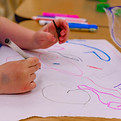
Local Planning Council
For Child Care Development
Nevada County
Together in California we are transforming our education system to meet the needs of all children and set them up for success in learning and life.
What is UPK?
Universal PreKindergarten (UPK) is the expansion of the state’s mixed delivery system to meet the early education needs of 3- and 4-year-old children and their families.
UPK brings more choices for preschool, including Transitional Kindergarten, which will be available to all 4-year-olds starting in the 2025-2026 school year.
Supplemental Resources for ECE Providers:

UPK can serve as a bridge between early childhood and TK-12 systems to increase students' readiness for school and schools' readiness for students, so that all children can thrive in school and in life.
%20(3).png)
Early Learning and Care System
TK-12 System
Developmental Growth and Thriving
Successful transitions to school
Strong foundational skills in elementary school
College and career success
Early learning and TK-12 leaders can leverage their expertise to build a bridge and create a system that puts the needs of children and families first.
Building on the work that has already been done, leaders will need to work together to build trust, support effective transitions, engage and empower families, expand a diverse and effective workforce pipeline, and align programs to meet child and family needs.
We envision a UPK system where:

Each child enters school thriving and ready to succeed in their educational journey.
All families, particularly in communities of color and in historically-marginalized communities, have high-quality early education opportunities and feel welcomed in early education spaces.
Families have more choices to select the PreK program that best fits their needs, without compromising their children’s access to learning opportunities.
Teachers are supported to provide experiences that nurture each child to reach their full potential.
Authentic partnerships among leaders of California’s tribal nations and TK-12 and early education leaders are formed to share knowledge and insight.
Through UPK, children will be supported by:
What's included in UPK:

Expansion of access to UPK programs for all 4-year-olds and more 3-year-olds

Access to two free meals each school day for all public education students in TK-12 regardless of income status

New expanded learning opportunities available during the summer and before and after school, building on existing programs

Increase to Early Childhood Mental Health Consultation reimbursement for California State Preschool Programs and other subsidized preschool providers, and expansion of supports for inclusion of more children with disabilities in UPK programs

Additional supports for more bilingual UPK programs, including tribal language revitalization programs and expansion of anti-bias training confronting hate, bigotry, and racism

Funding to support more districts and schools to work closely with teachers, students, families, and community partners to reduce barriers and increase access to services

Additional supports for UPK educators and leaders to increase early childhood knowledge and expertise across systems

Guidance for partnering with Tribal Governments, integrating Indigenous expertise, and engaging Indigenous community members in UPK implementation
Changes to California's existing PreK programs with UPK
Transitional Kindergarten (TK) is expanding to include more children every year and will soon be available for free to all 4-year-old children, regardless of family income or other child characteristics, at full implementation (in 2025-2026).
Eligible families can choose CSPP for their child even if their child is eligible for TK.
New reservation of slots for children with disabilities, paired with a requirement to serve a minimum of 5% through 2024-2025, 7.5% in 2025-2026, and then 10% after 2026-2027.
Extension of toddler reimbursement rate to more 3-year-olds.
Family language instrument development and implementation to support children's home language development.
These programs will continue to be critical partners for ensuring that families have authentic choices and that all children have access to the early learning opportunities they deserve.
Eligible families can choose Head Start or Private PreK for their child even if their child is eligible for TK.
Frequently Asked Questions
"What is happening with UPK implementation in Nevada County?" Answer coming soon!
"How do I get involved?" Answer coming soon!
"How does UPK fit with Quality Counts California (QCC)?" Quality Counts California (QCC) aligns closely with California's Universal Prekindergarten (UPK) initiative, as both aim to improve early childhood education quality and access across the state. Complementary quality frameworks: QCC provides the quality rating and improvement system (QRIS) that helps assess and improve UPK programs through standardized quality measurements. As California expands UPK, QCC helps existing early learning programs enhance quality to meet UPK standards. Professional development: QCC offers training and coaching that helps UPK providers and teachers meet higher quality standards. Continuous improvement: QCC's assessment tools help UPK programs identify areas for improvement and track progress over time. Consistent standards: QCC helps ensure UPK programs across diverse settings (e.g., school districts, state preschools, private providers) maintain consistent quality standards. The relationship is evolving as California continues implementing UPK, with QCC serving as a key quality assurance mechanism supporting the state's universal access goals.
Provider Resources
Forms
CA Early Care and Education Workforce Registry
Hubbe Resources for Mentors
